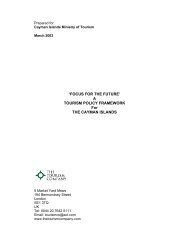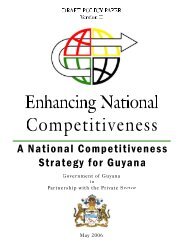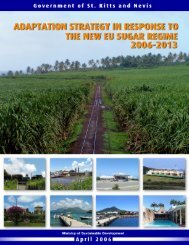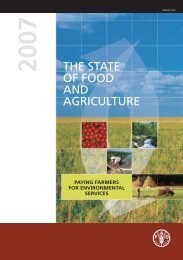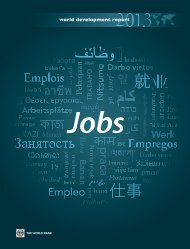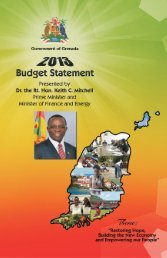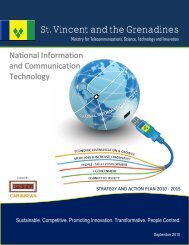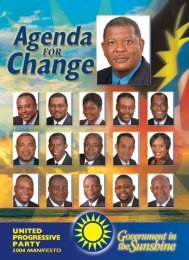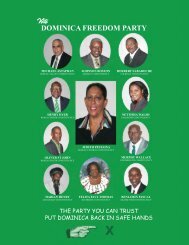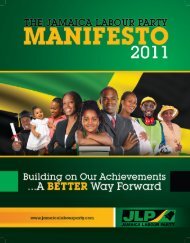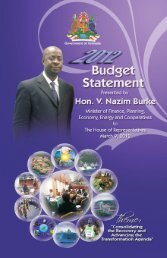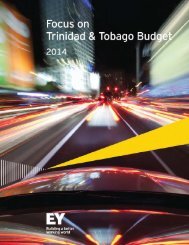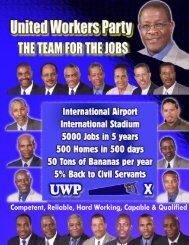Business Removing
Doing Business in 2005 -- Removing Obstacles to Growth
Doing Business in 2005 -- Removing Obstacles to Growth
- No tags were found...
You also want an ePaper? Increase the reach of your titles
YUMPU automatically turns print PDFs into web optimized ePapers that Google loves.
REMOVING OBSTACLES TO GROWTH: AN OVERVIEW 3<br />
What are the findings?<br />
The analysis leads to 3 main findings:<br />
• <strong>Business</strong>es in poor countries face much larger regulatory<br />
burdens than those in rich countries. They face 3<br />
times the administrative costs, and nearly twice as many<br />
bureaucratic procedures and delays associated with<br />
them. And they have fewer than half the protections of<br />
property rights of rich countries.<br />
• Heavy regulation and weak property rights exclude<br />
the poor from doing business. In poor countries 40% of<br />
the economy is informal. Women, young and low-skilled<br />
workers are hurt the most.<br />
• The payoffs from reform appear large. A hypothetical<br />
improvement to the top quartile of countries on the<br />
ease of doing business is associated with up to 2 percentage<br />
points more annual economic growth.<br />
<strong>Business</strong>es in poor countries face much larger<br />
regulatory burdens than those in rich countries<br />
It takes 153 days to start a business in Maputo, but 2 days<br />
in Toronto. It costs $2,042 or 126% of the debt value to<br />
enforce a contract in Jakarta, but $1,300 or 5.4% of the<br />
debt value to do so in Seoul. It takes 21 procedures to<br />
register commercial property in Abuja, but 3 procedures<br />
in Helsinki. If a debtor becomes insolvent and enters<br />
bankruptcy, creditors would get 13 cents on the dollar in<br />
Mumbai, but more than 90 cents in Tokyo. Borrowers<br />
and lenders are entitled to 10 main types of legal rights<br />
in Singapore, but only 2 in Yemen.<br />
These differences persist across the world: the countries<br />
that most need entrepreneurs to create jobs and<br />
FIGURE 1.3<br />
More regulatory obstacles in poor countries<br />
Source: Doing <strong>Business</strong> database.<br />
Ratio of poor to rich countries<br />
Cost to fire a worker<br />
Cost to enforce contracts<br />
Minimum capital for start-up<br />
Years to go through insolvency<br />
Days to register property<br />
Days to start a business<br />
Less –1.6<br />
protection<br />
of property –1.4<br />
rights<br />
–2.0<br />
1.6<br />
3.0<br />
1.9<br />
More<br />
1.8 delays<br />
2.2<br />
Legal rights of borrowers and lenders<br />
Contract enforcement procedures<br />
Investor protections: disclosure index<br />
Higher<br />
costs<br />
4.2<br />
boost growth—poor countries—put the most obstacles<br />
in their way (figure 1.3). The average difference between<br />
poor and rich countries on Doing <strong>Business</strong> cost indicators<br />
is threefold. Rich countries score twice poor ones on indicators<br />
relating to property rights—enforcing contracts,<br />
protecting investors and legal rights of borrowers and<br />
lenders. Latin American countries have very high regulatory<br />
obstacles to doing business. But African countries<br />
are even worse—and African countries reformed the<br />
least in 2003.<br />
Heavy regulation and weak property rights<br />
exclude the poor from doing business<br />
In The Mystery of Capital, Hernando de Soto exposed the<br />
damaging effects of heavy business regulation and weak<br />
property rights. With burdensome entry regulations, few<br />
businesses bother to register. Instead, they choose to operate<br />
in the informal economy. Facing high transaction costs<br />
to get formal property title, many would-be entrepreneurs<br />
own informal assets that cannot be used as collateral to<br />
obtain loans. De Soto calls this “dead capital.” The solution:<br />
simplify business entry and get titles to property.<br />
But many titling programs aimed at bringing assets<br />
into the formal sector have not had the lasting impact<br />
that reformers hoped for. Doing <strong>Business</strong> in 2005 helps<br />
explain why. While it is critical to encourage registration<br />
of assets, it is as important—and harder—to stop them<br />
from slipping back into the informal sector and to use<br />
their formal status to gain access to credit.<br />
Registering property—a new topic in this year’s report—explains<br />
that when formalizing property rights<br />
is accompanied by improvements in the land registry,<br />
collateral registry, the courts, and employment regulation,<br />
the benefits are much greater. If the formal cost<br />
of selling the property is high, titles will lapse by being<br />
traded informally. In Nigeria and Senegal that cost<br />
amounts to about 30% of the property value. And even<br />
when a formal title is well-established, it will not help to<br />
increase access to credit if courts are inefficient, collateral<br />
laws are poor and there are no credit information<br />
systems, because no one would be willing to lend. Add to<br />
this rigid employment regulation, and few people will be<br />
hired. Women, young and low-skilled workers are hurt<br />
the most: their only choice is to seek jobs in the informal<br />
sector (figure 1.4).<br />
Two examples. Nerma operates a small laboratory in<br />
Istanbul. She feels strongly about providing job opportunities<br />
for women but says employment legislation dis-



